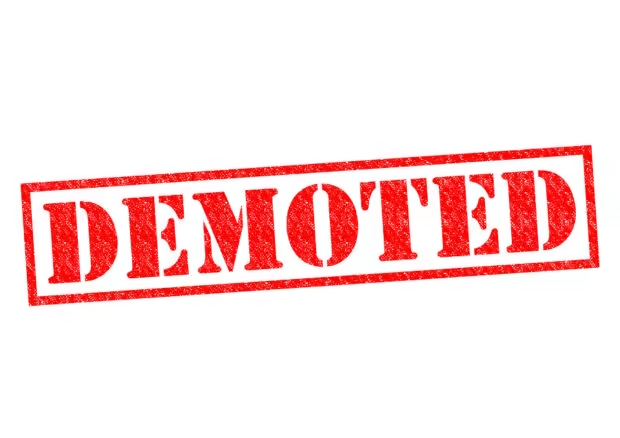What is demotion?
Demotion can be defined as a downward movement within an organization’s hierarchy. It may lead to an actual or perceived loss of authority and responsibility (Carson & Carson, 2007). Demotion may result in a decrease in salary (Ng, Sorensen, et al; 2007). There are two types of demotion namely voluntary demotion and involuntary demotion.
Types of demotion
Voluntary Demotion
A voluntary demotion is when employees choose to reduce their responsibilities or work part-time to meet their circumstances. A demotion can take the form of a decrease in rank, responsibility, the scope of control, job title, income (including benefits), or a combination of these. Employees can self-initiate a demotion voluntarily by asking for a reduction in rank, a span of control, or responsibility in their current position.
Related: Span of control: Everything you need to know
Involuntary Demotion
It is when the company initiates the relegation of relieving an individual of some of their responsibilities. Involuntary demotions could happen for various common reasons including disciplinary action or disciplinary sanction, the poor performance of the employee (including other performance issues), redundancies, lack of success after a promotion, organisational restructuring, a breach of contract in a current role, not following company policies, etc. (Verheyen & Guerry, 2018). Sometimes in rare situations, discrimination against someone's national origin, sexual orientation, religious beliefs, marital status, military status, equal employment opportunity, etc. may lead to the adverse action of unfair dismissal proceedings.
An involuntary demotion can be a blow to one's ego, career, and compensation benefits - bank account as they come with huge negative implications for the employee. Some of the negative implications include a decreased sense of identification with their job, less developmental chances after being demoted from their previous position and a perception of having less organizational support. However, if one has a good reason to suspect their employer discriminated against them in taking an adverse employment action of wrongful demotion, they might seek legal help on a wrongful termination lawsuit. This will work because the employer's options for handling a wrongful demotion are limited although there are legal risks.
Reasons why you can be demoted

- Misbehaviour: A breach of discipline may attract demotion as a punishment. An organisation can work only if proper discipline is maintained. A punitive action for such a breach may be necessary so that people do not break the rules of the company.
- Negligence is the duty: If an employee continuously fails to complete his/her assigned work consistently demotion may result.
- Irregular promotion: It may have happened that an incompetent person gets a promotion unsolicited. To correct this mistake, they may decide to demote this employee from the current position.
- Physical barrier: If an employee proves to be incapable to carry out assigned tasks as a result of physical state or a condition. The employer may have no choice but to demote the individual
- Unfitness: Sometimes employees may be demoted because of fitness. If the employee is not fit enough for the role then the employee may get a demotion. That is why authority may place him in a lower post.
- Problems of adjustment: If an employee cannot adjust to his working environment, he cannot do a good job and cannot provide his best effort.
- Punishment: If an employee committee gets any crime or corruption it has a bad impact on the organization. They can decide to give him a demotion as punishment.
- Restructuring: In the process of restructuring, some departments may be combined resulting in the elimination of some jobs. In such cases employees may be required to accept lower positions.
- Changes in processes of work: Sometimes changes in technology and the difference in methods and practices tend to make experienced heads unproductive resulting in a re-definition of their duties and responsibilities. The redefinition may result in demotion.
- Breach of Discipline: A breach of discipline may attract demotion as a punishment. An organisation can work only if proper discipline is maintained. A punitive action for such a breach may be necessary so that people do not break rules and regulations of the company.
- Inadequacy of Knowledge: A person may prove competent to perform his job properly. Failure to meet job requirements makes demotion necessary.
- Unable To Cope With Change: There is a rapid change in technology and methods of work. The existing employees may not be able to adjust themselves as per the new requirements. It may be due to a lack of education, technical skill, ill health, old age, or other personal reasons. Under these circumstances, new persons may be needed to take up such jobs.
- Organisational changes: Sometimes there may be organizational changes. It may be necessitated by either combining the departments or closing of some sections or departments. In such situations, the number of positions is reduced and some employees may be posted in lower positions until normality is restored. Such demotions are not due to any fault of the employees.
- Work-Life Balance: The employee may want less responsibility and fewer reporting staff members. The existing position level may not allow room for changes. A new mother who wants to lower the stress she experienced as a manager may decide to go to a lower level with fewer responsibilities.
- The employer decides to demote the employee based on the employee’s inability to produce quality work.
- The employer decides to demote the employee based on the belief that the employee’s attributes are more appropriate for another position.
- The employer decides to demote the employee because the employee can no longer keep up with the demands of the position.
Frequently Asked Questions on Demotion
Can an employer demote you without notice?
If your demotion violates your employment contract, then you may have the option to pursue legal action. Hence, you should have signed an original employment contract. If you did not sign an employment contract when you were hired, and you are not a member of an employee’s union, then you are an at-will employee. However, being an at-will employee does not mean a company can fire you for discriminatory reasons. Alternatively, you might consider lodging a formal grievance, to allow your employer to resolve the issue before it goes any further.
NB: This differs by country and your employment relationship. It would be best to seek legal help to know your rights from employment lawyers (experienced employment lawyers), employment attorneys, etc.
When can an employer demote an employee lawfully?
There are situations where it is lawful for the employer to follow a fair procedure to demote an employee. Demotions are most common in the context of:
- poor performance,
- misconduct,
- organisational restructuring and redundancies
In such scenarios, the employee may be prepared to accept a demotion as an alternative to dismissal. If the employer proceeds with the demotion without the employee's approval or the contractual right to do so, the employee has two options:
- continue working under protest and file a breach of contract claim,
- resign and future claim constructive dismissal.

